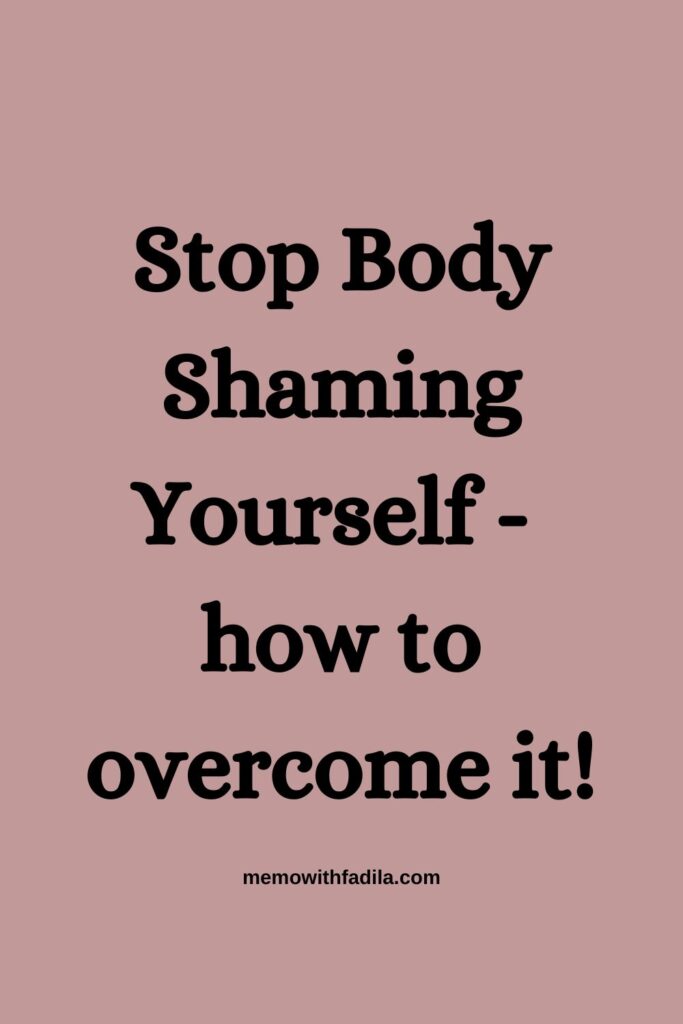How can you stop body shaming yourself? Do you find yourself trapped by your reflection? The time has come to take a break. I want us to put an end to all the criticism! Sincerity and gratitude are important. I want to surround myself with love and optimism. It is about developing a healthy self. Not worrying about my weaknesses and all. You find some of the things you can do to stop body shaming yourself or those around you.
What is Body Shaming?
Body shaming according to Merriam-Webster dictionary is to criticize or mock (someone) for supposed bodily faults or imperfections. It goes beyond just weight and size. Comments about someone’s age, hair, clothing, or even food choices can still be hurtful and contribute to a negative self-image.
It Is also interesting to note the relatively recent emergence of the term “body shaming,” underscoring how awareness of this harmful behavior has evolved.

What measures can one take to stop body shaming while fostering body positivity?
We can all start by challenging our internal judgments and biases. We all harbor hidden beliefs about our appearances and so understanding them will be beneficial to freeing ourselves and our actions.
Also, be mindful of our language and choose words that uplift and empower one another. Instead of focusing on perceived flaws, let’s highlight individual strengths and celebrate diversity.
Everyone can support and advocate for body-positive movements and organizations. You can do this by highlighting the voices that challenge unrealistic beauty standards and promote self-acceptance. We can create a more inclusive and supportive environment for everyone.
It’s important to keep talking about body shaming and its effects and to work towards a world where everyone feels comfortable and confident in their skin.
It’s fascinating to consider how the idea of “ideal” body shapes has changed so dramatically, from plumpness representing wealth and status to the current societal pressures emphasizing thinness.
Engaging in these conversations and acknowledging the historical and cultural nuances surrounding body size. We can move towards a future where all bodies are valued and respected. We can celebrate diversity and embrace the fact that beauty comes in all shapes and sizes.
Let’s continue to learn and grow together, promoting body positivity and challenging harmful beauty standards.
Body shaming is a harmful practice that targets people based on their physical appearance. It can be based on weight, size, hair, skin, clothing, and even perceived attractiveness.

Here are some of the reasons why people might be body-shamed:
Weight – This is the most common form of body shaming. People may be called “fat,” “skinny,” “overweight,” or “underweight.” These comments can be hurtful and damaging to a person’s self-esteem.
Body hair – Some people believe that women should remove all their body hair, while men should have hair on their chest and arms. People who don’t conform to these expectations may be body shamed.
Attractiveness – People considered attractive may be body shamed for being “too pretty” or “too perfect.” People who are considered to be unattractive may also be body shamed.
Food – People may be body shamed for what they eat or how much they eat. It could be harmful for people who are struggling with eating disorders.
Clothes: People may be body-shamed for the clothes they wear. This can be based on size, style, or anything else that someone decides is “inappropriate.”
Age – People may be body-shamed for their age. This is often referred to as “ageism.”
Hair – People may be body-shamed for their hair texture, color, or style. This can be especially hurtful for people of color, who are often told that their hair is “not professional” or “not pretty.”
Body shaming is harmful because it can lead to several negative consequences, including:
Low self-esteem
Depression and anxiety
Eating disorder
Body dysmorphia
Social isolation
Stop Body Shaming Yourself – how to overcome it!
It is important to remember that everyone is different and that there is no such thing as a “perfect” body. We should all be accepted and respected for who we are, regardless of our appearance.
Here are some things you can do to help stop body shaming:
Be mindful of your own words and actions. Ensure you’re not commenting negatively about someone’s appearance, even if you think it’s a joke.
Speak up if you hear someone body shaming someone else. Let them know that it’s not okay. Having the courage to tell someone off when they make hurtful comments to people shows you are aware of other people’s feelings and willing to promote positivity.
Challenge unrealistic beauty standards. Don’t believe everything you see in the media. There is no one right way to look.
Love your own body. Focus on all the things you love about yourself, not the things you think are wrong.
Everyone deserves to feel good about themselves. Let’s work together to create a world where body shaming is a thing of the past.
“We just need to be kinder to ourselves. If we treated ourselves the way we treated our best friend, can you imagine how much better off we would be?”
Meghan Markle

Stop body shaming yourself – how to overcome it (5 Tips)!
1. Let’s be kinder to ourselves. This could include practicing self-compassion and kindness. The first step to do this is to write down all the negative things you notice yourself saying about your body over a few days. After you’ve put everything down, consider how you would feel about the individuals you love the most in the world if they said those things about you.
Eliminate negative self-talk and fill them with positive self-talk; say good things you like about yourself. Always remember that your value is not dependent on your physical appearance. Your ability, kindness, innovative thinking, and plain awesomeness are unrelated to the body you are presently occupying. You are much more than just your physical appearance.
2. Turn critical moments in your life into opportunities for gratitude. For example, when you glimpse yourself in the mirror, do you lament that your legs are too fat/too thin/too short/etc.? Why not take a moment of sincere gratitude for the fact that they support you and take you to wonderful places?
3. Cultivate mental and creative strengths. If it is not within your power to be able to affect change, such as with a physical deformity, paralysis, etc., refocus that onto something mental instead. Our mind is the most powerful attribute, so pour your energy into things you can do with it rather than what you can’t do with your body.
4. You could try to stop comparing yourself to others. Remember, no two persons are the same. Refrain from following everything you see on social media. You have the power to filter positive accounts that will inspire you.
5. Speak to a good friend or seek professional help.
“You have to stand up and say, ‘There’s nothing wrong with me or my shape or who I am; you’re the one with the problem!’”
Jennifer Lopez

How you can handle negative comments from people
Don’t engage in long talks
Ignore their remarks like you would a child’s taunts. Showing indifference takes away their power. Don’t engage in lengthy explanations – it may fuel their fire. Short, sharp responses work best. Try to tailor your response to the situation. Sometimes cutting humor or a pointed comeback is most effective.
Establish strong boundaries
You have to show that you have boundaries. Call out inappropriate comments and set clear boundaries. Challenge family members pushing unrealistic standards with questions about their motives and the true purpose of their “help.” Don’t add fuel to the fire by showing vulnerability or emotional responses. Predators attack the weak.
Excuse yourself
This may be the best option for persistent offenders or those who pose a threat. Prioritize your well-being and distance yourself from toxic individuals who bring you down.
Remember that shaming often comes from the shamer’s insecurities. Don’t take it personally. You must focus on yourself, and prioritize your mental health and well-being. Protect yourself from negativity and surround yourself with supportive people.
You have the right to stand up for yourself and set boundaries. Use these strategies to claim your power and silence your inner and outer critics.

On a lighter note
Body shaming is a pervasive and harmful issue with serious consequences for mental and emotional well-being. It’s important to raise awareness about its impact and promote body positivity instead.
What say you?
We’d love to hear your thoughts.
Feel free to pin this post to your Pinterest board, share it on Facebook, and subscribe to the blog if you haven’t already done so. Thank you again, and I look forward to seeing you in my next post.

Leave a Reply